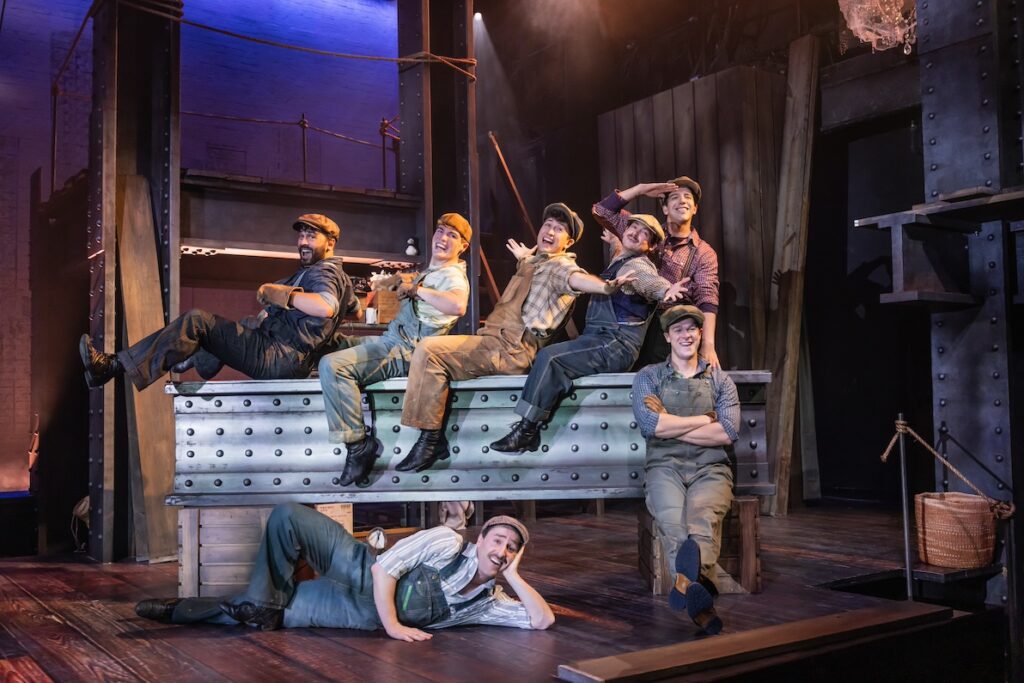Off-Broadway’s ‘Empire’ Follows in Footsteps of Broadway’s ‘New York, New York,’ but Audiences May Desire Different Directions
Set at the dawn of the Great Depression and in 1976, this musical focuses on the men and women who conceived and built the Empire State Building. At times, the production can have an amateurish feel.

A little more than a year ago, Broadway welcomed “New York, New York,” a big, splashy new musical inspired by the Martin Scorsese film of the same name. Ostensibly a tribute to the Big Apple, the show defined its characters largely by race, ethnicity, and class, but ultimately had nothing interesting to say about any of those subjects — or, by extension, about the diversity and pluck that give our city its distinct personality.
The new off-Broadway entry “Empire” is smaller in scale, but not dissimilar in approach. Set at the dawn of the Great Depression — roughly 15 years before “New York, New York” unfolded — and in 1976, this musical focuses on the men and women who conceived and built the Empire State Building, forging a testament to New York’s indomitability even as the economy was crumbling around them.
Featuring a book, music, and lyrics by Caroline Sherman and Robert Hull, “Empire” introduces us both to the kinds of swells who envisioned and financed the building — among them historical figures such as Governor Al Smith and businessman and political player John J. Raskob — and laborers whose toil brought the project to fruition.
The latter group is represented by Irish, Italian, and Polish immigrants, as well as indigenous people of the Mohawk tribe, including one woman named Rudy Shaw. Rudy is the show’s link to the 1970s, when we meet Sylvie Lee, her daughter by a Polish man named Joe Pakulski, and Sylvie’s daughter, Rayne.

Then there’s Frances Belle Wolodsky, a feisty Brooklynite who goes by “Wally,” whom Sylvie describes as the governor’s “can-do gal.” Played with an easy gusto by Kaitlyn Davidson, Wally is one of those stock female characters who reliably proves smarter and more efficient than the arrogant, often condescending men around her. When Smith takes credit for one of her ideas early on, she simply shrugs and says: “It’s what I do.”
The governor eventually emerges as a mensch, and he’s made quite likable in Paul Salvatoriello’s sanguine performance. Other members of his set can prove less sympathetic, particularly one Mayor Walker — based on New York’s own Jimmy Walker, who was brought down by scandal in the early 1930s; he’s portrayed here with convincing brattiness by Devin Cortez, who gets to bellow out lines like, “Stuff the niceties,” and, “Fix this. Now!”
However boilerplate the characters can seem, Ms. Sherman and Mr. Hull wisely avoid using them as vehicles for preachy social commentary, so that “Empire” winds up feeling more quaint than bombastic. And director Cady Huffman — best known for her work as a performer, including a Tony Award-winning turn in the original Broadway cast of “The Producers” — guides the company with obvious affection.
Still, the production can have an amateurish feel. One problem appears to be Shannon Slaton’s sound design; at the preview I attended, at least, some of the dialogue seemed muffled, even as a few actors sounded too heavily miked. Lorna Ventura’s workmanlike choreography is another issue; production numbers can suggest a high school staging with gifted students, rather than delivering the originality and polish her dancers could surely serve well.
A few cast members rise above these shortcomings. Mr. Cortez, one of several who juggles two or more roles, proves as gently appealing as Joe as he is obnoxious as the mayor. J Savage and Morgan Cowling are charming and sing beautifully as the Irishman and his wife, Ethan and Emily O’Dowd, who get the show’s prettiest song, “Castles in the Air.”
In the end, these virtues are not sufficient to make “Empire” — which is overlong at roughly two and a half hours, including an intermission — consistently compelling. The city that never sleeps certainly offers many better ways to spend your time and entertainment dollars.

